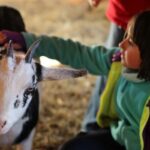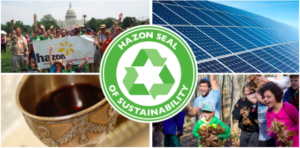Dear green teams, leaders, provokers of thought and change!
The compilation below is aimed to help you push for healthier and more sustainable nourishment in your communities and institutions.
It is intended for all Jewish institutions, organizations, congregations and households.
If these resources are helpful to you we’d love to hear about it at seal@hazon.org.
AND, if you have a green team in your community/organization and/or are already working on making it healthier and more sustainable, submit your application to the Hazon Seal program and we will keep you updated once we are ready to accept new site.
We wish you and our earth a better, healthier future!
Get funding for your first ever vegan event 
As we continue to encourage plant-based menus, this may help you kick things off. Let your tastebuds guide you with this awesome opportunity from the Food for Thought campaign.
Jewish Text Sources on Food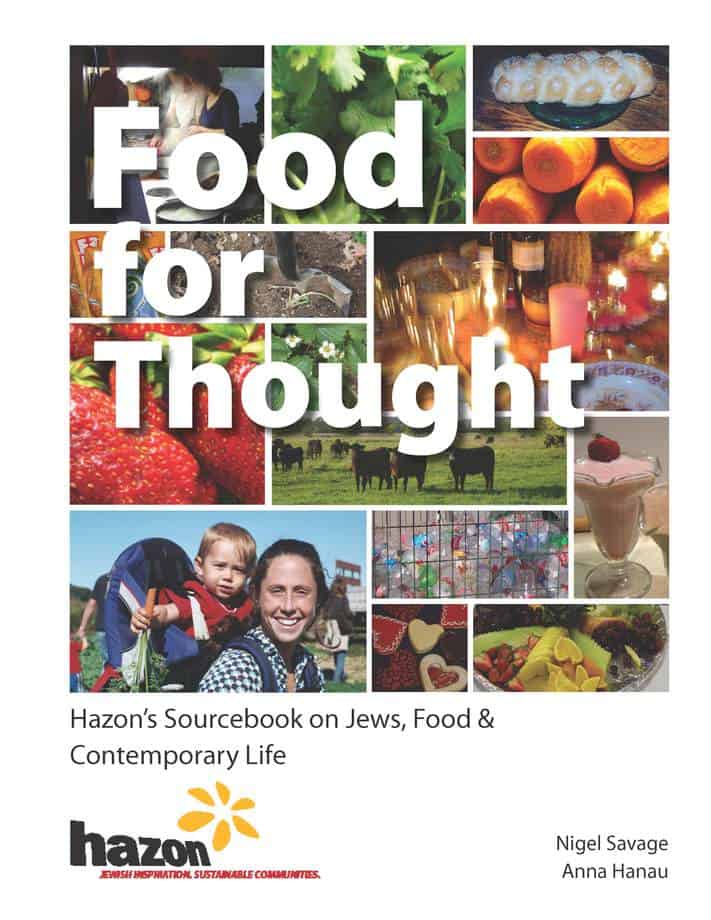
Hazon’s guide ‘Food For Thought’ is an oldie but a goodie. It features Jewish sources regarding our relationship to the food we consume. It is designed to encourage readers to think critically about the food that they eat and how their food choices affect the health of their community and the planet. Use it in a d’var torah, class, or discussion group, or incorporate excerpts in creative signage, newsletters, and more.
Download your free copy HERE
Learn how to promote sustainable & healthy meals in your community 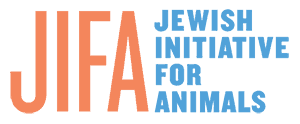
View JIFA’s (Jewish Initiative for Animals) webinar ‘Nudging Diners Toward Sustainable, Healthy Meals’ here. The webinar suggests a number of resources that can support your work toward the Hazon Seal certification: DefaultVeg.org; Menus of Change; Forward Food Culinary Trainings. The folks at JIFA are eager to work with you to help implement DefaultVeg in your dining operations. Don’t hesitate to reach out for support from Ilana Braverman, Program Manager, ilana@farmforward.com.
Incorporate all of this into your Green Kiddush
Happy Fall! With your organization in full swing (back to school, done with summer planning), now is a great time to host a green kiddush. Green kiddushes remind your organization of your commitment to the Hazon Seal, and provide important awareness that we are all Shomrei Adamah and need to incorporate our eco values into our Jewish traditions.
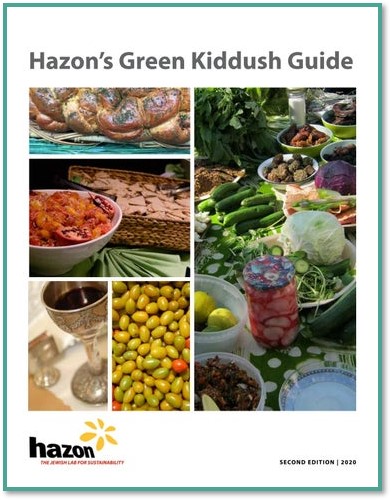
See our guide for hosting a green kiddush here, and read the Sustainable Kiddush case study for inspiration!
Among our suggestions:
- Serve plant-based foods (serve an egg-free challah through the Shamayim program!)
- Use real (not disposable) plates, cups, utensils, and tablecloths
- Compost everything (all food scraps from food preparation, after the meal, and any paper products including any paper napkins)
- Save leftovers in reusable containers (rather than ziplocs or saran wrap)
Use this excellent new book to educate your community

We enthusiastically encourage you to read We Are the Weather: Saving the Planet Begins at Breakfast by Jonathan Safran Foer. The book explores the central global dilemma of our time in a surprising, deeply personal, and urgent new way. The task of saving the planet will involve a great reckoning with ourselves—with our all-too-human reluctance to sacrifice immediate comfort for the sake of the future. We have, Foer reveals, turned our planet into a farm for growing animal products, and the consequences are catastrophic. Only collective action will save our home and way of life. And it all starts with what we eat—and don’t eat—for breakfast.
AND, Hazon has created a free discussion guide for Jewish communities to help you explore the themes of the book, whether that be on your own, in chevruta (pairs), or as part of larger community programs like book club discussions, “lunch and learns,” or other formats. Then, the guide will turn you toward action.
The book and discussion guide are great for all. If you’re interested in hosting a book group or other program related to We Are the Weather, or anything at the intersection of Judaism, food, and climate, contact Becky O’Brien, Hazon’s Director of Food & Climate, becky@hazon.org.
Do you know a vegetarian or vegan rabbi? Let them know about this
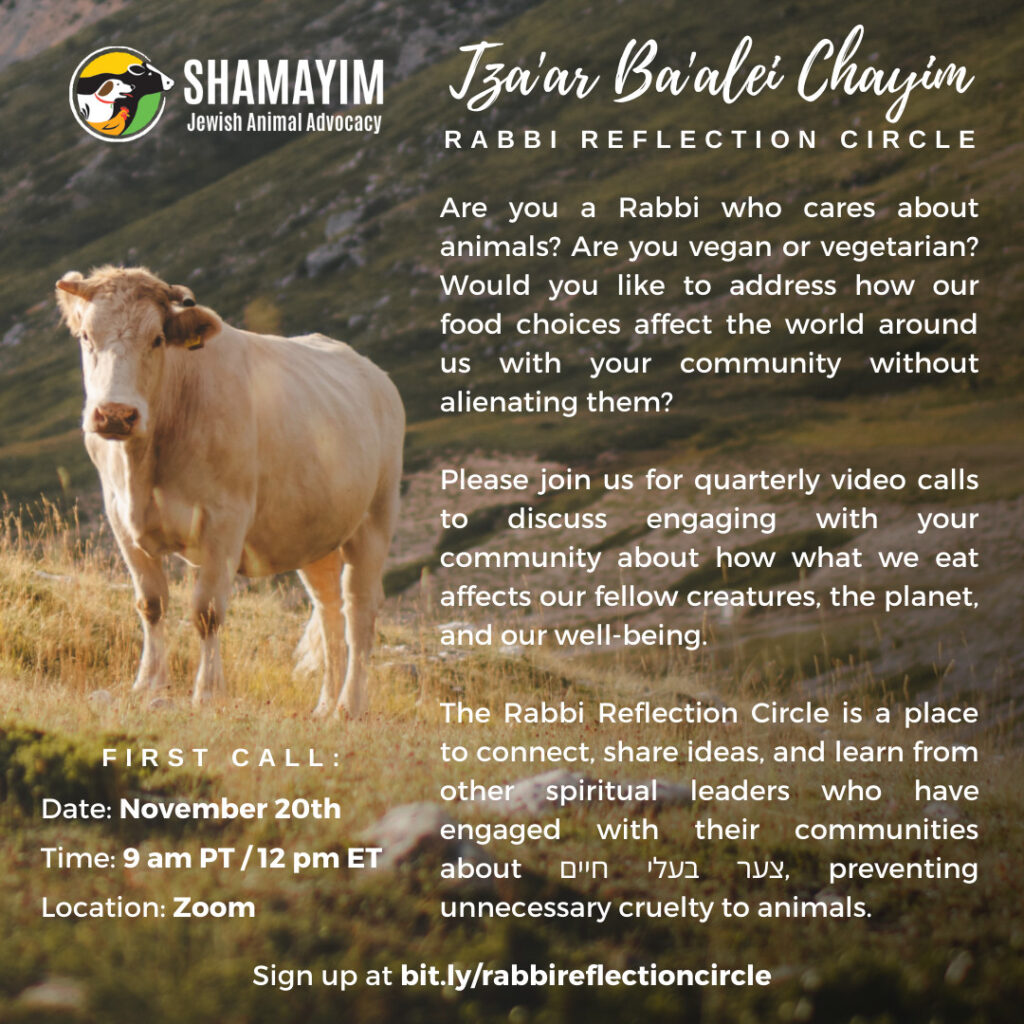
Choose to invest in “Higher Welfare” animal products
Consumers have the opportunity to support farmers at the forefront of upholding higher standards of animal welfare and environmental protection in production. This meat is priced higher than what you would normally find in your grocery store. This reason for the increase is based on what environmentalists call “the externalities”: the cost of preventing all the harm that is associated with factory farming, such as animal suffering and air, water, and soil pollution.
These externalities are completely unaccounted for in the widespread corporate-industrial model of factory farming. Purchasing these industrial products perpetuates a cruel and environmentally harmful system. “Higher welfare” meat comes from animals that live longer lives because they are not bred to grow unnaturally fast. This costs more for farmers and consumers, but it is better for the animals, the planet, and people’s health, not to mention makes a delicious product you can truly enjoy and celebrate.
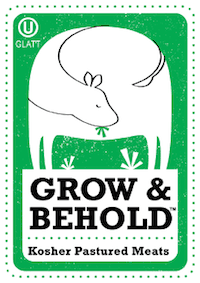
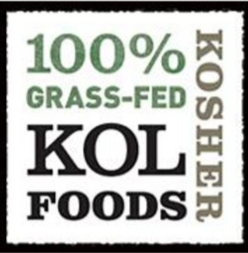
Yes, it costs more. So eat less, but eat better and in alignment with your values.
Our friends at Grow and Behold and Kol Foods will work with you to match your organization/household needs with product availability in ways that are most cost effective for you.
- Grow & Behold: email info@growandbehold.com for more information on wholesale pricing for events or regular meals at your institution.
- Kol Foods: Contact them here for wholesale rates.
Interesting articles and news
More than 11,000 scientists from around the world declare a ‘climate emergency’. This Washington Post article features the new study titled ‘World scientists’ warning of a climate emergency’ which provides an additional validation that focusing on food is critical in our mission to tackle climate change.
